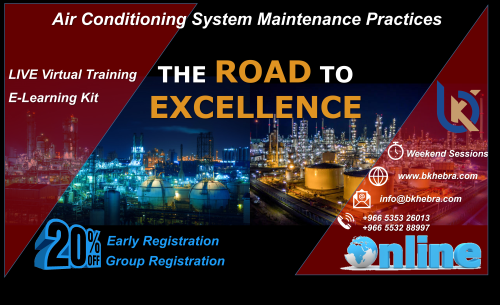| Training Code | Date | Duration | Venue | Fees |
|---|---|---|---|---|
| Keep following, we are updating our training schedules. | ||||

This course will provide an excellent introduction to the fundamentals of Heating, Ventilation and Air-conditioning. It commences with a review of psychometric charts and then examines the factors that nuance design choices, indoor air quality, load calculations and heating/ventilation and air-conditioning systems. The course is introducing many important subjects. The details of terminologies, psychometric processes, heat load calculations, selection of appropriate equipment/system, installation procedure of equipment’s, its maintenance and troubleshooting.
The course provides overview of operation and maintenance (O&M) programs specially designed to enhance HVAC systems without sign cant capital investment. The intent of this paper is not to provide hardcore maintenance or troubleshooting aspects but an insight to O&M practices that can ensure the best performance and comfort for your system.
Specie examples are provided for typical HVAC troubleshooting problems that have occurred in the instructor’s experience. It is essential that participants have a fundamental understanding of the subject matter if they are to successfully design to avoid problems, as well as diagnose HVAC problems when they occur.
In this 3-days B. Khebra’s Air Conditioning System Maintenance Practices course participants will learn how to describes the main components of a heating, ventilation and air conditioning system in details. It will start by introducing the basics of a theoretical system and its performance analysis. Then, an overview of the system components will be highlighted together with the construction details of each. Work will be carried out to describe the main operating principles and to emphasis on the rule of operation and maintenance for these parts. The participants will be sharing the new ideas for operation with the help of catalogues, photos and available software programs.
Upon successful completion of this course, the delegates will be able to:
The course is intended for use primarily to the students, end users, operators, architects, contractors and HVAC designers.
On successful completion of this training course, BK’s Certificate with eligible Continuing Professional Education credits (CPE), will be awarded to the delegates , one CPE credit is granted per 50 minutes of attendance.